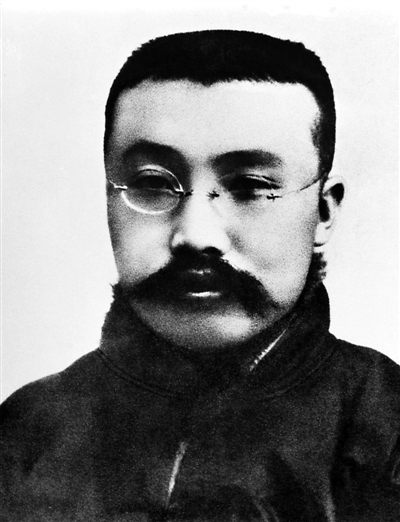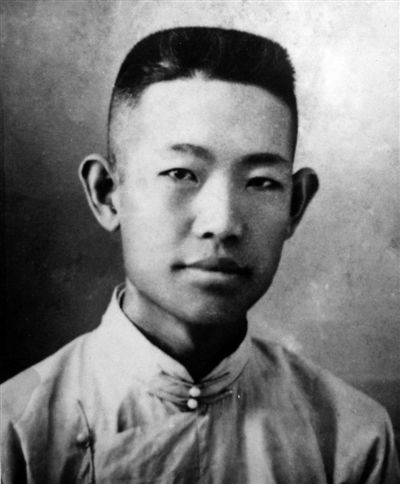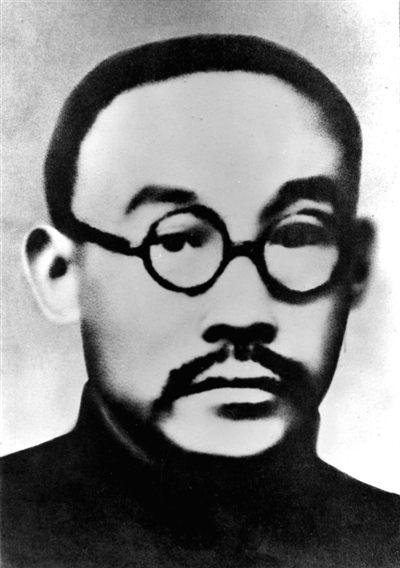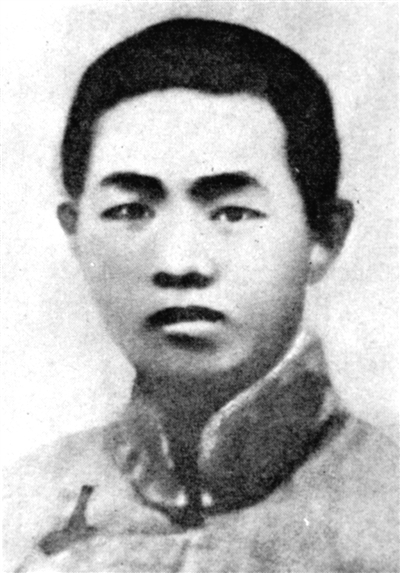Li Dazhao: Iron shoulder moral spirit to inspire later generations
In 1889, Li Dazhao was born in Daheituo Village, Leting County, Hebei Province.His parents died when he was young, and he was brought up by his grandfather.In 1913, he crossed east to Japan and studied at Waseda University in Tokyo, where he began to get in touch with socialist thought and Marxist theory.When Japan put forward the "Twenty-one Articles" aimed at the destruction of China, Li Dazhao took an active part in the patriotic struggle of the Association of Students studying in Japan and drafted the "Warning to the National Father", calling on the people of the whole country to unite and defend the beautiful land.

After returning to China in 1916, Li became a library director and professor of economics at Peking University. He also joined the editorial staff of the magazine New Youth.He took an active part in the New Culture Movement, propagandized the spirit of democracy and science, attacked the old ethics and morals, launched a fierce struggle against the feudal stubborn forces, and became a leader of the New Culture Movement.In his article "Youth", he called on the youth to "break the shackles of history, clear away the filth of history, create the life of the nation, and restore the youth of the nation".
The victory of the October Revolution in Russia encouraged Li Dazhao, he published a series of "comparative view of the French and Russian revolution", "the victory of the subaltern", "the victory of Bolshevism" and other articles and speeches, enthusiastically eulogize the October Revolution, he confidently predicted: "look at the future of the world, it will be the red flag of the world!"
In the process of propagating the October Revolution, Li Dazhao changed from a patriotic democrat to a Marxist, and then became the earliest disseminator of Marxism in China.After the May 4th Movement in 1919, he was more committed to the propaganda of Marxism. He published "My View of Marxism" in New Youth, systematically introducing Marxist theory.Li Dazhao promoted the wide spread of Marxism in China and prepared the ideological conditions for the establishment of the Communist Party of China.
Li Dazhao was one of the main founders of the Communist Party of China.Early in 1920, Li Dazhao and other revolutionaries began to discuss the establishment of a proletarian political party in China.In the autumn of the same year, he led the establishment of the early organization of the Communist Party in Beijing and the Beijing Socialist Youth League, and actively promoted the establishment of a nationwide Communist Party organization.
After the founding of the Communist Party of China, Li Dazhao directed the work of the north on behalf of the CPC Central Committee, propagating Marxism in the vast areas of the north, carrying out the workers' movement and establishing the Party organizations.From 1922 to 1924, he was entrusted by the party, running between Beijing, Shanghai, Guangzhou, to help Sun Yat-sen to reorganize the Kuomintang, for the establishment of the first Kuomintang cooperation of the United Front made a significant contribution.Li Dazhao also led the Northern Party organizations to cooperate with the May 30th Movement and the victorious march of the Northern Expedition to carry out the struggle against imperialism and warlords, making outstanding contributions to the victory of the Great Revolution.
On April 6, 1927, Li Dazhao was arrested and put into prison in Beijing.In prison, he was subjected to torture, always strictly guard the party's secrets, unyielding, awe-inspiring.On April 28, Li Dazhao died a heroic death at the age of 38.
Li Dazhao's brilliant life is a true portrayal of his "iron shoulder to bear justice, a brilliant hand to write the article".The great cause initiated by Li Dazhao and the ideological legacy he left behind will never be indelible. The seeds of revolution he sowed have taken root, blossomed and borne fruit on the land of China.
Wang Zhimei was born in 1898, the original name of Wang Ruijun, Shandong Province, Juxian Dabixing Village (now belongs to Zhucheng City), is the Shandong Party organization early organizers and leaders, one of the founders of the Communist Party of China.
Wang Jinmei: perfection is liberation

In 1918, Wang Jinmei was admitted to the First Normal School of Shandong Province.In 1919, the May Fourth Movement broke out.Under the initiative of Wang Jinmei and others, the Shandong Students' Federation was established in May, and he was elected as one of the leaders.A few days later, thousands of students attended the anti-Japanese Salvation Congress, where Wang made an impassioned speech for more than an hour.
On May 23, all 21 secondary and above schools in Jinan went on strike under the call of a strike declaration drafted by Wang Zhimei and others.During the struggle, he became close friends with Deng Enming.At that time, Deng was a student at the provincial No. 1 Middle School.
In order to study Marxism, Wang Jinmei visited Li Dazhao at Peking University in March 1920.After returning to Jinan, he, together with Deng Enming and others, initiated the establishment of Lixin Society and the bi-monthly Lixin magazine to study and disseminate new ideas and new cultures.
In the spring of 1921, Wang Jinmei and Deng Enming initiated the establishment of the early organization of the Communist Party of China in Jinan.To express his firm belief in communism, he wrote a poem with passion: "The rich and the poor see the battlefield, perfect only liberation.Wei water and sediment into the sea, Joe has the foot to see the vicissitudes of life."He changed his name to "All the Beauty" for self-encouragement.
In July 1921, Wang Jinmei and Deng Enming went to Shanghai to attend the First National Congress of the Communist Party of China as the early organization representatives of the Communist Party of China in Jinan.That year, Wang Zhimei was 23 years old.
Under Wang Jinmei's initiative, in September 1921, Ji 'nan established the Marx Theory Research Institute.In July 1922, Jinan Branch of the Communist Party of China was established.
On the run all day long, Wang became ill from overwork, contracted tuberculosis and coughed up blood frequently.But he was still sick, running in Jinan, Qingdao, Beijing, Shanghai, Guangzhou and other places, propaganda Marxism, organized and launched workers' strikes.
In April 1925, Wang Jinmei came to Qingdao again.When the drums and gongs were ringing to celebrate the victory of the strike, he fell ill among the workers.
In July of that year, lying on the hospital bed in her hometown, Wang Chumei knew that her time was short. She told her mother that she wanted to go back to Qingdao.He was well aware that his dear comrades were there, and there was much to do.
On August 19, 1925, Wang Jinmei died in Qingdao at the age of 27.When he was seriously ill, he asked the person in charge of the Qingdao Party Organization to record and dictate his will: all comrades should work hard and strive to the end for the liberation of the proletariat and all mankind and the complete realization of communism.
In 1961, Dong Biwu after Shandong, a time from the Communist Party of China has been held for 40 years, wrote "remember the United States of Comrade Wang" : "40 years ago at the meeting, Nanhu boat pan language calm.Ji 'nan famous people know how much, you and En Ming not old pine."
He Shuheng, a member of the Communist Party of China and one of the founding members of the Communist Party of China, was born in Changchong, a village in Ningxiang, Hunan province, built against a hill surrounded by green pines and cypress.
He Shuheng: clank oath with life practice

He Shuheng was born in a peasant family in 1876. He was a hard-working boy.In 1913, at the age of 37, He Shuheng was admitted to the First Teachers' Workshop of Hunan Provincial Government.Here, He Shuheng got acquainted with Mao Zedong, two people are congruent, the knot falls deep friendship.In April 1918, He Shuheng, Mao Zedong and others initiated and organized the establishment of the Xinmin Society, and in 1920, jointly initiated and established the early organization of the Communist Party of Hunan.
In July 1921, Mao Zedong and He Shuheng went to Shanghai to attend the first National Congress of the Communist Party of China as representatives of Hunan.In October, He Shuheng participated in the establishment of Hunan Branch of the Communist Party of China and served as a member of the branch.On May 21, 1927, the Mari Incident took place in Changsha.In spite of the danger, he went to Shanghai via Changsha and established an underground printing press for the Party, insisting on the secret struggle.
In 1928, after the closing of the Sixth Congress of the Communist Party of China, He Shuheng, together with Xu Terri, Wu Yuzhang, Dong Biwu, Lin Boqu, entered the Sun Yat-sen University in Moscow to study.At that time, He Shuheng was already over 50 years old, but he worked very hard to study revolutionary theories and finally learned Russian.
In November 1931, He Shuheng entered the Central Revolutionary Base Area and was elected as a member of the Central Executive Committee of the Soviet Republic of China. He served as the People's Commissioner of the Provisional Central Government, the Acting Minister of the Ministry of Internal Affairs and the Chairman of the Provisional Supreme Court.In his work, he insisted on seeking truth from facts, paid attention to investigation and research, and treated his work meticulously. He often went to various parts of the Soviet area for investigation and research.When conducting research, He brings with him "three things" : a cloth bag, a notepad and a flashlight for taking notes and walking at night.In October 1934, after the main force of the Central Red Army's Long March, He Shuheng was ordered to stay in the Central Revolutionary Base and persist in guerrilla warfare.
On February 24, 1935, on the way to transfer from Jiangxi to Fujian, He Shuheng died heroically in the Battle of Changting. At the age of 59, he fulfilled his clattering oath of "I will shed my last drop of blood for the Soviet Union".
Now, more than 50,000 Party members come to Changchong Village to visit the former residence of He Shuheng every year.Local officials introduced that the red resources will be fully excavated to inherit the revolutionary spirit of He Shuheng, and through the development of red tourism to drive development and benefit the masses.
Deng Enming: sing the Internationale and die easy

"Thirty-one years in a flash, ambition unfulfilled helpless days;Even if only I die first, then frequently comfort."This is "farewell", written by Deng Enming, a member of the Communist Party of China, in prison.
Deng Enming was born in 1901 in Shuipu Village, Yuping Town, Libo County, Guizhou Province.In 1918, Deng Enming was admitted to Jinan Provincial No. 1 Middle School.After the May 4th Movement broke out, Deng Enming was elected as the leader of the Student Government Association and organized students to participate in the strike movement.In November 1920, he, Wang Zhimei and others organized the progressive group "Lixin Society" to introduce the October Revolution in Russia and attack the social situation.
In the spring of 1921, Deng helped initiate the establishment of the early organization of the Communist Party in Jinan.In July of the same year, Deng Enming and Wang Zhimei went to Shanghai to attend the first National Congress of the Communist Party of China, and participated in the founding of the Communist Party of China.After the meeting, he returned to Jinan to establish the Shandong branch of the Communist Party of China and served as a member of the branch.
In January 1922, Deng Enming went to Moscow to attend the congresses of communist parties and national revolutionary organizations of the Far East countries.After returning to China, he concentrated on organizing the workers' movement.
Under the leadership of Deng Enming and others, in February 1925, the labor union of Jiaoji Railway led the workers to hold a general strike, forcing the railway bureau to agree to part of the workers' requirements.In the same year, he, together with Wang Zhimei and others, organized and led the strike of Qingdao Japanese Textile Factory Workers Union, which formed the first strike climax in the history of Qingdao.
In August 1925, Deng was appointed secretary of the Shandong Provincial Executive Committee of the Communist Party of China and was arrested and imprisoned in November.Via party organization multi manage rescue, be able to go out on parole for medical treatment.In June 1926, Deng Enming secretly returned to Qingdao again and presided over the work of the municipal Party committee.
In the spring of 1928, Deng Enming was appointed Secretary of the CPC Qingdao Municipal Committee.After that, he was arrested in Jinan as a traitor.In prison, he led his friends to fight against the enemy, and twice organized prison breaks, so that some comrades rushed out of prison and escaped.Deng Enming, because of excessive punishment, difficult action, failed to escape from prison.
On April 5, 1931, at the execution ground of Hou's family compound, Weiba Road, Jinan City, Deng Enming died in irons, singing the Internationale. He was only 30 years old.
"My great uncle Deng Enming's life was short and brilliant."Deng's grandniece Deng Qingmei said, "To do one's job well is the best memorial to their ancestors."















